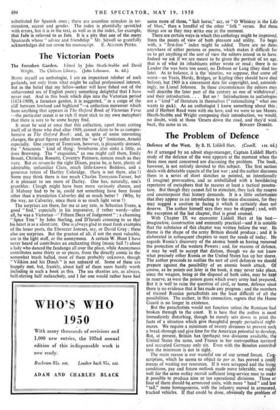The Victorian Poets
BEING myself an anthologist, I am an impenitent relisher of such garlands, not only from what might be called professional interest, but in the belief that my fellow-seeker will have fished out of the unharvested sea of English poetry something delightful that I have never met. And in this book which dips into the Victorian period (1824-1909), a forsaken garden, it is suggested, "in a coign of the cliff between lowland and highland "—a collection moreover which bans anything that appears in The Oxford Book of Victorian Verse —the particular ocean is so rich (I must stick to my own metaphor) that there is sure to be some happy find.
It must be said at once that this collection, apart from cutting itself off at those who died after 1909, cannot claim to be as compre- hensive as The Oxford Book: and, in spite of some interesting changes, the great figures suffer from the " no Q " limitation, Arnold especially. One corner of Tennyson, however, is pleasantly stressed, the " Anacaona " kind of thing: Swinburne also sinks a little, as does Browning. The " exquisites," as one might call them, Emily Brontd, Christina Rossetti, Coventry Patmore, remain much as they were. But en revanche the right Dixon, praise be, is here, plenty of admirable, unfamiliar Clare, much little-known Beddoes, and a generous ration of Hartley Coleridge. (Sara is not there, alas !) Some may think there is too much Charles Tennyson-Turner, but it is pleasant to see more of Darley. One has, naturally, one's grumbles: Clough might have been more variously chosen, and if Mahony had to be in, could not something have been found other than a translation Calverley did so much better ? (Why, by the way, no Calverley, since there is so much light verse ?) The surprises are there, for me at any rate, in Sebastian Evans, a good " find," especially in his impressive, if rather wordy—after all, he was a Victorian—" Fifteen Days of Judgement " ; a charming " Spice Tree " by John Sterling, and D'Israeli crooning to us that his heart is as a silent lute. One is always glad to meet fresh examples of the lesser poets, the Ebenezer Joneses, say, or David Gray ; these also are surprises. But the greatest of all, if not the most valuable, are in the light stuff, or the anonymous. A certain W. Hunt I have never heard of contributes an enchanting thing (music hall ?) about a lady who danced the fandango all over the place, while Anonymous contributes some thirty or so pieces, from the directly comic to the somewhat brash ballad, most of them probably unknown, though " Vilikins, and his Dinah" is not unheard of. Some of these are happily met, but, frankly, about half of them seem hardly worth including in such a book as this. The sea shanties are, as always, half-stirring half melancholy, and I for one would rather have had some more of those, " Salt horse," say, or " 0 Whiskey is the Life of Man," than a handful of the other " folk " verses. But these things are as they may strike one at the moment.
There are certain ways in which this anthology might be improved, from the points of view of both pleasure and utility. To begin with, a " first-line " index might be added. There are no dates anywhere of either perSons or poems, which makes it difficult for us to get anything of the sort of view the editors intend us to have. Indeed we ask if we are meant to be given the portrait of an age, that is of what its inhabitants either wrote or read ; there is no Landor (he was born too soon), no Dobson or Lang (they died too late). As to balance, it is the 'nineties, we suppose, that come off worst—no Yeats, Hardy, Bridges, or Kipling (they should have died before), but 1909 is a convenient date for copyright), and, astonish- ingly, no Lionel Johnson. In these circumstances the editors may well describe the later part of the century as one of withdrawal ; and their introduction. . . . But no ! Introductions to anthologies are a " kind " of literature in themselves (" rationalising " what one wants to pick). As an anthologist I know something about this ; and if Herbert Read were with me here, and we were to see Messrs. Heath-Stubbs and Wright composing their introduction, we would, no doubt, wink at those 'Omers down the road, and they'd wink










































 Previous page
Previous page